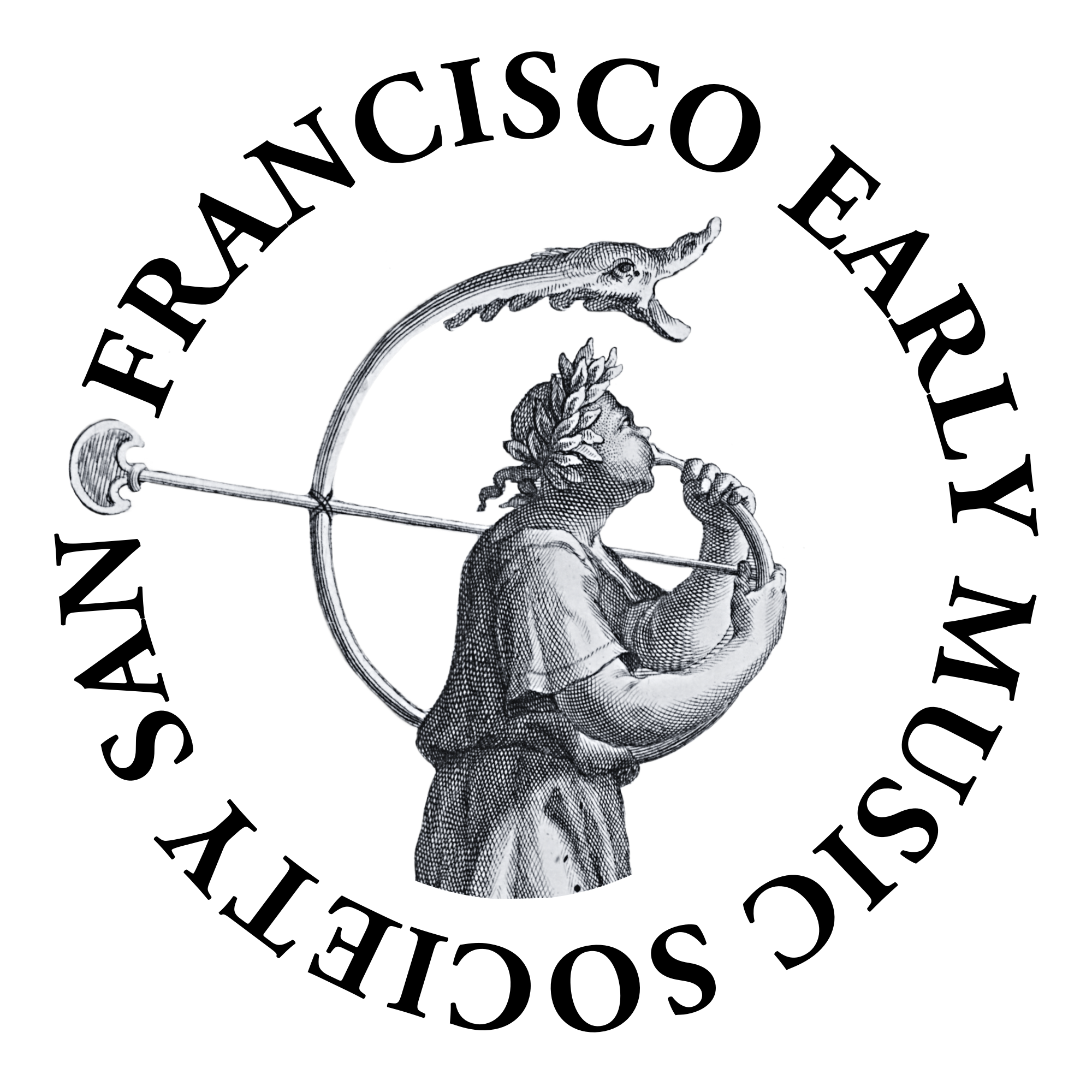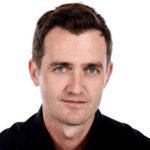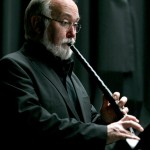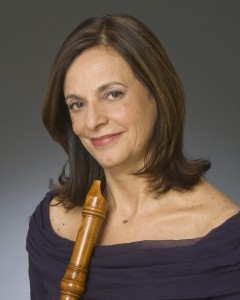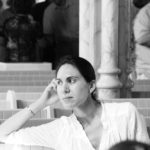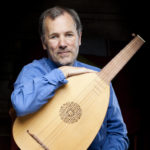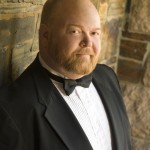Julie Andrijeski, violin
Aaron Sheehan , voice
Bruce Dickey, cornetto
Clea Galhano, recorder
Rita Lilly, voice
Anna Marsh, baroque bassoon
Janet See, baroque and classical flute
Kathryn Montoya, oboe
Nigel North, lute and theorbo
Linda Pearse, Workshop and Artistic Director, sackbut
William Skeen, baroque cello and viola da gamba
Peter Sykes, harpsichord
David Wilson, baroque violin
Julie Andrijeski, violin
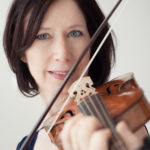 Julie Andrijeski (violin) is a performer, scholar, and teacher of early music and dance. She is Artistic Director and Concertmaster of the Atlanta Baroque Orchestra, Co-Director of the New York-based early music ensemble Quicksilver, Principal Player with Apollo’s Fire, and frequently performs with diverse early music groups across the nation and abroad. As a full-time Senior Instructor in the Music Department at Case Western Reserve University, she teaches early music performance practices and directs the Baroque Music and Dance Ensembles. Additionally, she is Teacher of Baroque Violin at the Cleveland Institute of Music. Special teaching engagements include a bi-annual residency at the Juilliard School and invitations to lead workshops at learning institutions, most recently the Oberlin Conservatory, the Peabody Conservatory, Indiana University, and the University of Michigan. A native of Boise, Idaho, Andrijeski holds a doctoral degree in Early Music from CWRU, and Violin Performance degrees from Northwestern University (M.M.) and the University of Denver (B.M.). Her recordings can be found on Acis Productions, Dorian Recordings, Avie, Koch, Centaur, and Musica Omnia as well as on independent labels. In 2016 she was awarded a Creative Workforce Fellowship from Cuyahoga County (Ohio) Arts and Culture and the Thomas Binkley Award from Early Music America in recognition for her outstanding achievement in performance and scholarship as CWRU ensemble director.
Julie Andrijeski (violin) is a performer, scholar, and teacher of early music and dance. She is Artistic Director and Concertmaster of the Atlanta Baroque Orchestra, Co-Director of the New York-based early music ensemble Quicksilver, Principal Player with Apollo’s Fire, and frequently performs with diverse early music groups across the nation and abroad. As a full-time Senior Instructor in the Music Department at Case Western Reserve University, she teaches early music performance practices and directs the Baroque Music and Dance Ensembles. Additionally, she is Teacher of Baroque Violin at the Cleveland Institute of Music. Special teaching engagements include a bi-annual residency at the Juilliard School and invitations to lead workshops at learning institutions, most recently the Oberlin Conservatory, the Peabody Conservatory, Indiana University, and the University of Michigan. A native of Boise, Idaho, Andrijeski holds a doctoral degree in Early Music from CWRU, and Violin Performance degrees from Northwestern University (M.M.) and the University of Denver (B.M.). Her recordings can be found on Acis Productions, Dorian Recordings, Avie, Koch, Centaur, and Musica Omnia as well as on independent labels. In 2016 she was awarded a Creative Workforce Fellowship from Cuyahoga County (Ohio) Arts and Culture and the Thomas Binkley Award from Early Music America in recognition for her outstanding achievement in performance and scholarship as CWRU ensemble director.
Aaron Sheehan, voice
Grammy Award winning tenor Aaron Sheehan has quickly established himself as one of the leading American tenors of his generation. His voice is heard regularly in the US and Europe, and he is equally comfortable in repertoire ranging from oratorio and chamber music to the opera stage. He sang the title role in Boston Early Music Festival’s recording of Charpentier’s La Descente d’Orphée aux Enfers, which won Best Opera Recording at the 2015 Grammy Awards.
His singing has taken him to many festivals and venues, including Tanglewood, Lincoln Center, Kennedy Center, the Concertgebouw, the Metropolitan Museum of Art, Théâtre des Champs Elysées, and the early music festivals of Boston, San Francisco, Houston, Tucson, Washington, DC, and Madison. Known especially for his Baroque interpretations, Aaron has made a name as a first-rate singer of oratorios and cantatas. He has appeared as soloist in concert with Boston Early Music Festival, Orpheus Chamber Orchestra, Seattle Symphony, Tafelmusik, San Juan Symphony, American Bach Soloists, The Handel and Haydn Society, Boston Baroque, Tempesta di Mare, Pacific Music Works, Opera Lafayette, Aston Magna Festival, Bach Collegium San Diego, Tragicomedia, Folger Consort, and Les Voix Baroques.
Bruce Dickey, cornetto
Bruce Dickey is one of a handful of musicians worldwide who have dedicated themselves to reviving the cornetto – once an instrument of great virtuosi, but which lamentably fell into disuse in the 19th century. The revival began in the 1950s, but it was largely Bruce Dickey, who, from the late 1970s, created a new renaissance of the instrument, allowing the agility and expressive power of the cornetto to be heard once again. His many students, over more than 30 years of teaching at the Schola Cantorum Basiliensis, have helped to consolidate and elevate the status of this once forgotten instrument. For his achievements the Historic Brass Society awarded him in 2000 the prestigious Christopher Monk Award for “his monumental work in cornetto performance, historical performance practice and musicological scholarship.” In 2007 he was honored by British conductor and musicologist Andrew Parrott with a “Taverner Award” as one of 14 musicians whose “significant contributions to musical understanding have been motivated by neither commerce nor ego.”
In the course of his long career as a performer and recording artist he has worked with most of the leading figures in the field of early music, including the legendary pioneers of historically informed perfomance, Gustav Leonhardt, Frans Brüggen and Nikolaus Harnoncourt. He was a member for over ten years of Jordi Savall’s Hesperion XX, and has frequently and repeatedly collaborated with Ton Koopman, Monica Huggett, Philippe Herreweghe and many others. Of special importance has been his long-time friendship and collaboration with Andrew Parrott, and in more recent years with Konrad Junghänel.
Bruce Dickey can be heard on countless recordings. His solo CD (“Quel lascivissimo cornetto…”) on Accent with the ensemble Tragicomedia was awarded the Diapason d’or. His second solo CD, entitled “La Bella Minuta”, was released on the Passacaille label in 2011.
In addition to performing, Bruce Dickey is much in demand as a teacher, both of the cornetto and of seventeenth-century performance practice. In addition to his regular class at the Schola Cantorum he has taught at the Royal Conservatory in The Hague, the Accademia Chigiana in Siena, and the Early Music Institute at Indiana University, as well as master classes in the United States, Canada, Europe and Japan. He is also active in research on performance practice, and has published, together with Michael Collver, a catalog of the surviving cornetto repertoire, and, together with trumpeter Edward Tarr, a book on historical wind articulation. In 1997, together with his wife Candace Smith, he founded Artemisia Editions, a small publishing house which produces editions of music from 17th-century Italian convents.
In 1981, Bruce Dickey moved to Italy, partly to be closer to the origins and source materials for his instrument and its music. He currently lives with his wife and daughter in a country house, surrounded by vineyards, outside of Bologna, home of the original Concerto Palatino.
Clea Galhano, recorder
Brazilian recorder player Cléa Galhano is an internationally renowned performer of early, contemporary and Brazilian music. Galhano has performed in the United States, Canada, South America and Europe as a chamber musician, collaborating with recorder player Marion Verbruggen, Jacques Ogg, Belladonna, and Kingsbery Ensemble. As a featured soloist, Galhano has worked with the Saint Paul Chamber Orchestra, New World Symphony, Musical Offering, Milwaukeke Baroque and Lyra Baroque Orchestra directed by Christopher Hogwood, Emmanuele Haim and Harry Bicket.
Among other important music festivals, Ms. Galhano has performed at the Boston Early Music Festival, the Tage Alter Music Festival in Germany, Saint-Savin Early Music Festival and at Wigmore Hall in London, Weill Hall at Carnegie Hall and Merkin Hall in New York, and Palazzo Santa Croce in Rome, always receiving acclaimed reviews. Ms. Galhano was featured in 2006 in the Second International Recorder Congress in Leiden, Holland in 2007, and 2013 at the International Recorder Conference in Montréal, and in 2012 at the ARS International Conference, Portland, Oregon.
Galhano studied in Brazil at Faculdade Santa Marcelina, the Royal Conservatory (The Hague), and the New England Conservatory of Music in Boston, earning a LASPAU, Fulbright Scholarship and support from the Dutch government. As an advocate of recorder music and educational initiatives, she served for six years on the National Board of the American Recorder Society, and is the Music Director of the Recorder Orchestra of the Midwest. Ms. Galhano recently received the prestigious 2013 McKnight Fellowship Award, MSAB Cultural collaborative and MSAB Arts Initiative.
Currently, she is the Executive Artistic Director of The St. Paul Conservatory of Music and a faculty member at Macalester College. Ms. Galhano has 8 recordings available on Dorian, Ten Thousand Lakes and Eldorado labels and she is the recipient of the National Arts Associate of Sigma Alpha Iota.(www.cleagalhano.com)
Clea has been recently appointed as an Adjunct Lecturer in Music, Recorder, for the fall semester of 2018 at Jacobs School of Music , Indiana Univeristy.
Rita Lilly, voice
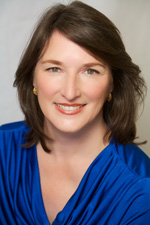 Rita Lilly is familiar to audiences in oratorio, recital, and opera, but most notably for her performances of baroque and early music. She has been lauded by The New York Times for “possessing a voice of strength, clarity, and virtuosity” and by the S.F. Classical Voice for “having a pure, silvery voice with plenty of color.” She is a native New Yorker and has appeared as a featured soloist with the American Boychoir, American Classical Orchestra, American Symphony Orchestra, ARTEK, Bachworks, Bach Aria Group, Clarion Music Society, Collegium Antiquum, Concert Royal, REBEL, Trinity Church Concerts at One Series, and the New York Consort of Viols, among others. As the soprano soloist of the Waverly Consort, she toured throughout the US and abroad. She has been featured on live broadcasts on New York’s WNYC, WNCN, National Public Radio, and Radio-Canada. She made her N.Y. Weill Recital Hall debut in Pergolesi’s Stabat Mater with Collegium Antiquum and has toured with harpsichordist Anthony Newman.
Rita Lilly is familiar to audiences in oratorio, recital, and opera, but most notably for her performances of baroque and early music. She has been lauded by The New York Times for “possessing a voice of strength, clarity, and virtuosity” and by the S.F. Classical Voice for “having a pure, silvery voice with plenty of color.” She is a native New Yorker and has appeared as a featured soloist with the American Boychoir, American Classical Orchestra, American Symphony Orchestra, ARTEK, Bachworks, Bach Aria Group, Clarion Music Society, Collegium Antiquum, Concert Royal, REBEL, Trinity Church Concerts at One Series, and the New York Consort of Viols, among others. As the soprano soloist of the Waverly Consort, she toured throughout the US and abroad. She has been featured on live broadcasts on New York’s WNYC, WNCN, National Public Radio, and Radio-Canada. She made her N.Y. Weill Recital Hall debut in Pergolesi’s Stabat Mater with Collegium Antiquum and has toured with harpsichordist Anthony Newman.
Since coming to the San Francisco Bay Area, Ms. Lilly has performed as soloist with Albany Consort, American Bach Soloists, AVE, Bay Choral Guild, Berkeley Early Music Festival, California Bach Society, Chora Nova, City Concert Opera, Magnificat Baroque Ensemble, Musicsources, Santa Cruz Baroque festival, S.F. Concert Chorale, S.F. Renaissance Voices, and Sacramento Baroque. Her recordings include three with the Waverly Consort on EMI; Handel and Vivaldi’s Dixit Dominus with the American Boychoir on Musical Heritage; Scarlatti’s St. Cecilia Mass on Newport Classic; Sowerby’s Medieval Poem on Naxos; a German Baroque Christmas with American Classical Orchestra on Musicmasters and Orff’s Carmina Burana with the S.F. Concert Chorale. She has recently become Music director of Lafayette Christian church in Lafayette, Ca. and maintains an active vocal studio in the Bay Area.
Anna Marsh, baroque bassoon
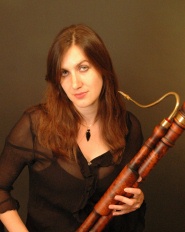 Anna Marsh performs regularly on her five historical bassoons from the Renaissance through the Classical periods. She is currently principal bassoonist in Tempesta di Mare and Opera Laffayette and has also appeared often with Tafelmusik, Ensemble Caprice, Opera Atelier, Seattle Baroque, The National Cathedral, and the Washington Bach Consort. She has also appeared with Handel and Haydn Society, Atlanta Baroque, Musica Angelica, Ensemble Voltaire, Apollo’s Fire, Foundling Orchestra, Americantiga, Chicago Opera Theater, the Hollywood Bowl, Banff Centre for the Arts, Musica nel Chiostro, the Bloomington Early Music Festival, Sante Fe Pro Musica, Aradia Ensemble, Indianapolis Museum of Art, and others. Anna has also taught or given master classes at the Hawaii Performing Arts Festival, the Eastman School of Music, the Los Angeles Music and Art School, the Albuquerque Double Reed Workshop (now the Western Baroque Music Festival); she also teaches privately. She co-directs the group Ensemble Lipzodes, which has toured Brazil, Ecuador, and the US and has recorded two CDs.
Anna Marsh performs regularly on her five historical bassoons from the Renaissance through the Classical periods. She is currently principal bassoonist in Tempesta di Mare and Opera Laffayette and has also appeared often with Tafelmusik, Ensemble Caprice, Opera Atelier, Seattle Baroque, The National Cathedral, and the Washington Bach Consort. She has also appeared with Handel and Haydn Society, Atlanta Baroque, Musica Angelica, Ensemble Voltaire, Apollo’s Fire, Foundling Orchestra, Americantiga, Chicago Opera Theater, the Hollywood Bowl, Banff Centre for the Arts, Musica nel Chiostro, the Bloomington Early Music Festival, Sante Fe Pro Musica, Aradia Ensemble, Indianapolis Museum of Art, and others. Anna has also taught or given master classes at the Hawaii Performing Arts Festival, the Eastman School of Music, the Los Angeles Music and Art School, the Albuquerque Double Reed Workshop (now the Western Baroque Music Festival); she also teaches privately. She co-directs the group Ensemble Lipzodes, which has toured Brazil, Ecuador, and the US and has recorded two CDs.
Anna has been a concerto soloist with the Arion Orchestre Baroque, The Dryden Ensemble, Foundling Orchestra, Americantiga Orchestra, the USC Early Music Ensemble, and the Indiana University Baroque Orchestra. She has also worked in the library and/or in administration at the Los Angeles Philharmonic, the Washington National Gallery of Art, Museum of the City of New York, and the Weyerhauser Technology Center. She has recorded for Centaur, Avie, Naxos, the Super Bowl, Analekta, ATMA and the 2012 Grammy nominated recording of Handel’s Israel in Egypt with Trinity Wall Street Choir and orchestra on Musica Omnia.
Janet See, baroque and classical flute
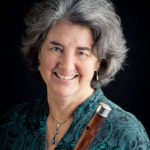 Janet See is one of today’s outstanding performers on baroque and classical flute. For over 30 years she has performed as a soloist, in chamber music, and in orchestras throughout North America and Europe. In London, where Janet lived for 12 years, she played principal flute for Sir John Eliot Gardiner’s two orchestras, and with those groups recorded the complete Mozart Operas and Beethoven Symphonies as well as numerous other discs. While in London she also played principal flute for ‘The Taverner Players’, conducted by Andrew Parrott. In North America Janet plays principal flute with Philharmonia Baroque under Nicholas McGegan and has recorded Vivaldi and Mozart Concertos with that orchestra. She also performs frequently with the Portland Baroque Orchestra and as guest soloist with chamber music ensembles throughout the US and Canada. Among her highly acclaimed recordings are the Vivaldi Concertos and the complete Bach Flute Sonatas, both recorded on the Harmonia Mundi label. Other labels she has recorded on include DG Archive, EMI, Erato, Hyperion and Phantom Partner. Janet is on the Early Music Faculty at Cornish College of the Arts in Seattle and is an active and enthusiastic teacher of early flutes and also of interpreting the nuance and language of baroque and classical music on modern flute. She received her degree on the modern flute at Oberlin Conservatory, training with Robert Willoughby. Her post-graduate training was with Frans Vester in The Hague. Janet is a qualified teacher of the F.M. Alexander Technique, having trained in London with Walter Carrington.
Janet See is one of today’s outstanding performers on baroque and classical flute. For over 30 years she has performed as a soloist, in chamber music, and in orchestras throughout North America and Europe. In London, where Janet lived for 12 years, she played principal flute for Sir John Eliot Gardiner’s two orchestras, and with those groups recorded the complete Mozart Operas and Beethoven Symphonies as well as numerous other discs. While in London she also played principal flute for ‘The Taverner Players’, conducted by Andrew Parrott. In North America Janet plays principal flute with Philharmonia Baroque under Nicholas McGegan and has recorded Vivaldi and Mozart Concertos with that orchestra. She also performs frequently with the Portland Baroque Orchestra and as guest soloist with chamber music ensembles throughout the US and Canada. Among her highly acclaimed recordings are the Vivaldi Concertos and the complete Bach Flute Sonatas, both recorded on the Harmonia Mundi label. Other labels she has recorded on include DG Archive, EMI, Erato, Hyperion and Phantom Partner. Janet is on the Early Music Faculty at Cornish College of the Arts in Seattle and is an active and enthusiastic teacher of early flutes and also of interpreting the nuance and language of baroque and classical music on modern flute. She received her degree on the modern flute at Oberlin Conservatory, training with Robert Willoughby. Her post-graduate training was with Frans Vester in The Hague. Janet is a qualified teacher of the F.M. Alexander Technique, having trained in London with Walter Carrington.
Kathryn Montoya, oboe
Kathryn Montoya teaches baroque oboe and recorder at Oberlin Conservatory and the University of North Texas. She appears with a variety of orchestral and chamber music ensembles including the Boston Early Music Festival Orchestra, Tafelmusik, the Wiener Akademie, Pacific Musicworks, and Apollo’s Fire among others. Ms. Montoya received her degrees at Oberlin Conservatory and Indiana University School of Music, Bloomington. While at IU she was the recipient of the prestigious Performer’s Certificate and was awarded a Fulbright Scholarship to study in Germany.
Kathryn has performed for the Globe’s Tony award-winning production of Twelfthe Night on Broadway and the Boston Early Music Festival’s Grammy-winning cd of Charpentier operas. Recent projects include performances with the LA Philharmonic and a recording of Handel’s Almira with the Boston Early Music Festival. When not performing or teaching Kathryn can often be found in Hereford, England working on a 18th century barn conversion with her partner, James. As you can imagine, this process takes up a lot of her time. But this is a big project, so it can’t be rushed and everything must be done in a meticulous fashion to ensure that the conversion is worthwhile. With that being said, using something like these metal building kits can help to ensure that her barn gets turned into the building she dreams of, as well as providing a safe and stable environment for what she’s going to use it for. We can’t wait to see the end product.
Nigel North, lute and theorbo
Nigel North has also always adored teaching. Following many years of committed teaching in Europe (in London, Berlin and Den Haag) Nigel has since 1999 been Professor of Lute in the “Early Music Institute” at Indiana University, Bloomington, USA from where he continues his varied life as performer and teacher. Mr. North has produced numerous recordings, including a series titled “Bach on the Lute.” He is the author of Continuo Playing on the Lute, Archlute, and Theorbo.
Linda Pearse, Workshop and Artistic Director, sackbut
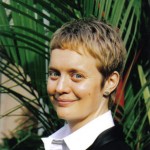 Linda Pearse is the Artistic Director of the San Francisco Early Music Summer Baroque Workshop, the Sackville Festival of Early Music and of the chamber music ensemble ¡Sacabuche! In addition to music-only programs, Pearse’s interdisciplinary projects engage new music, early music, texts, soundscapes, and images in conversations that explore cultural contacts and collisions in the early modern period. Her critical edition of Seventeenth-Century Italian Motets with Trombone is published with A-R Editions (April 2014). With ¡Sacabuche!, she released an album of Seventeenth-century Italian Motets on the ATMA Classique label (Sept 2015). She is currently working on seventeenth-century music from Czech archives in preparation for performances and recording with ¡Sacabuche! during the 2017–18 season. She is also preparing a volume for publication, A Catalogue of Early Trombone Music. Pearse has performed, recorded, and/or toured with groups including ¡Sacabuche!, Rose des Vents, Music of the Baroque (Chicago), Ensemble Caprice, the Houston Chamber Choir, and at festivals including the Berkeley Festival and Exhibition, Early Music Vancouver, Early Music Society of the Islands, Festival International de Musique Baroque de Lamèque, the International Historic Brass Conference, and the Society of Seventeenth-Century Music.
Linda Pearse is the Artistic Director of the San Francisco Early Music Summer Baroque Workshop, the Sackville Festival of Early Music and of the chamber music ensemble ¡Sacabuche! In addition to music-only programs, Pearse’s interdisciplinary projects engage new music, early music, texts, soundscapes, and images in conversations that explore cultural contacts and collisions in the early modern period. Her critical edition of Seventeenth-Century Italian Motets with Trombone is published with A-R Editions (April 2014). With ¡Sacabuche!, she released an album of Seventeenth-century Italian Motets on the ATMA Classique label (Sept 2015). She is currently working on seventeenth-century music from Czech archives in preparation for performances and recording with ¡Sacabuche! during the 2017–18 season. She is also preparing a volume for publication, A Catalogue of Early Trombone Music. Pearse has performed, recorded, and/or toured with groups including ¡Sacabuche!, Rose des Vents, Music of the Baroque (Chicago), Ensemble Caprice, the Houston Chamber Choir, and at festivals including the Berkeley Festival and Exhibition, Early Music Vancouver, Early Music Society of the Islands, Festival International de Musique Baroque de Lamèque, the International Historic Brass Conference, and the Society of Seventeenth-Century Music.
William Skeen, baroque cello and viola da gamba
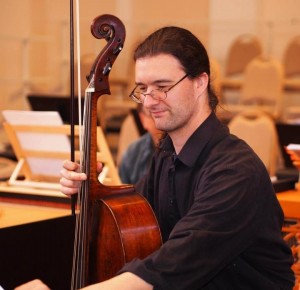 William plays principal cello in Philharmonia Baroque Orchestra, American Bach Soloists, Musica Angelica, and Marin Baroque. He also performs with Portland Baroque Orchestra and Voices of Music, where he is featured in numerous high-definition YouTube videos.
William plays principal cello in Philharmonia Baroque Orchestra, American Bach Soloists, Musica Angelica, and Marin Baroque. He also performs with Portland Baroque Orchestra and Voices of Music, where he is featured in numerous high-definition YouTube videos.
In addition to performing with almost every baroque orchestra on the west coast. Mr. Skeen is a sought-after chamber musician. He plays with the New Esterhazy Quartet, the Grammy-nominated ensemble, El Mundo, and La Monica. William has been a viola da gamba soloist with the Dallas Symphony under Jaap van Zweden, and continuo cellist with the Los Angeles Philharmonic, conducted by Gustavo Dudamel. He has toured to Colombia, Peru, Brazil, and across North America as principal cellist in John Malkovich’s theater productions.
His teaching duties include Adjunct Professor of Baroque Cello and Viola da Gamba at University of Southern California, co-director of the SFEMS Classical Workshop, and starting in 2013, the American Bach Soloists Academy, as well as the SFEMS Baroque Workshop. William holds a Bachelor of Music degree from the Cleveland Institute of Music, working with Alan Harris, and a Master of Music degree from U.S.C., studying with Ronald Leonard.
Peter Sykes, harpsichord
Peter Sykes is Associate Professor of Music and Chair of the Historical Performance Department at Boston University, where he teaches organ, harpsichord, clavichord, performance practice, and continuo realization, Music Director of First Church in Cambridge, and instructor of harpsichord in the Historical Performance Department of the Juilliard School in New York City. He performs extensively on the harpsichord, clavichord, and organ, including recent appearances in London, Paris, Amsterdam, Berlin, Sao Paulo, and Leipzig, and has made ten solo recordings of organ repertoire including his acclaimed organ transcription of Holst’s “The Planets.” Newly released is a recording of the complete Bach harpsichord partitas on the Centaur label, and an all-Bach clavichord recording on the Raven label; soon to be released will be the complete Bach obbligato violin sonatas with Daniel Stepner. He also performs and records with Boston Baroque and Aston Magna. A founding board member and current president of the Boston Clavichord Society, he is the recipient of the Chadwick Medal (1978) and Outstanding Alumni Award (2005) from the New England Conservatory, the Erwin Bodky Prize (1993) from the Cambridge Society for Early Music, and the Distinguished Artist Award from the St. Botolph Club Foundation (2011). He is the newly elected President of the Westfield Center for Historical Keyboard Studies.
David Wilson, baroque violin
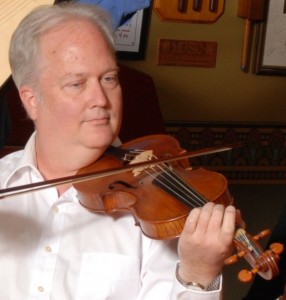 David Wilson, baroque violin, has performed extensively with period instrument ensembles in the United States and Europe, including Philharmonia Baroque Orchestra, American Bach Soloists, and as concertmaster with Jubilate, the North Carolina Baroque Orchestra, and Pacific Bach Project. An avid chamber musician, he plays regularly with Ensemble Vermillian and Magnificat, and he is a founding member of Archetti, Florilegia, the Galax Quartet, and other ensembles. A co-founder of the Bloomington Early Music Festival, he performs regularly at the Boston Early Music Festival and the Berkeley Early Music Festival. He has taught baroque violin at Indiana University, where he earned the Doctor of Music degree in Early Music, and he holds degrees in violin from Bowling Green State University in Ohio and The Catholic University of America in Washington, D.C.
David Wilson, baroque violin, has performed extensively with period instrument ensembles in the United States and Europe, including Philharmonia Baroque Orchestra, American Bach Soloists, and as concertmaster with Jubilate, the North Carolina Baroque Orchestra, and Pacific Bach Project. An avid chamber musician, he plays regularly with Ensemble Vermillian and Magnificat, and he is a founding member of Archetti, Florilegia, the Galax Quartet, and other ensembles. A co-founder of the Bloomington Early Music Festival, he performs regularly at the Boston Early Music Festival and the Berkeley Early Music Festival. He has taught baroque violin at Indiana University, where he earned the Doctor of Music degree in Early Music, and he holds degrees in violin from Bowling Green State University in Ohio and The Catholic University of America in Washington, D.C.
His interests outside of music include cosmology, zymurgy, and science fiction (and he would love to discover a science fiction novel about a homebrewing cosmologist). In recent years he has performed and recorded classical music of India and the Ottoman Empire with Lux Musica (East Meets West Music and Golden Horn Records), contemporary music with the Galax Quartet (Innova Recordings), and 18th century concerti with Archetti (Centaur Records). He is the author of Georg Muffat on Performance Practice, published by Indiana University Press.

